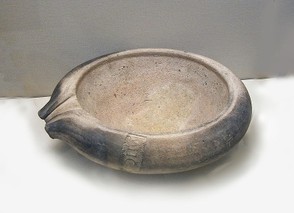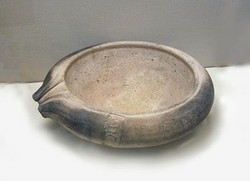Moretum
Moretum was a pesto or type of thick patè. We aren't sure if it was scooped up with bread, spread on something else or just eaten as is. The following recipe serves eight. By the way, the device the pesto is in is called a mortaria.
Ingredients
- 5 small bulbs of fresh garlic
- 2 1/4 pounds of feta (or other crumbly savory) cheese
- 10 celery stalks
- 5 bunches of coriander (cilantro [Mexican parsley] may be substituted) leaves
- 5 bunches of rue leaves (celery leaves may be substituted)
- 1/2 cup extra virgin olive oil
- 3/4 cups white wine vinegar
Directions
Depending on how strongly of garlic you want this to taste, do one of the following. Either roast the garlic bulbs until soft or peel and loosely chop the uncooked garlic. Roasting garlic first will reduce the strength of the garlic and make it sweeter.
* To roast garlic bulbs, cut the top of the bulb to expose the clove. Roast for ten to fifteen minutes or until the cloves become soft.
Add all of the above ingredients, except the cheese to the food processor. Pulse until a creamy consistency is reached. Add this to a mixing bowl and add the cheese. The cheese does not have to be feta, but for an authentic taste it should be made from goats milk and be a hard crumbly cheese. Ricotta can also be used, but this changes the taste substantially.
This stuff is great with toasted pita chips or other flat bread.
Roasting the garlic first will give this "pesto" a much less pungent and milder flavor. The fresh garlic version is for true (die-hard) garlic lovers.
Experiment, if you wish, by cutting this recipe in half and preparing it both ways.







 Crêpes and Crêpe Disheson 09/14/2016
Crêpes and Crêpe Disheson 09/14/2016
 About Me - Liam Beanon 11/28/2014
About Me - Liam Beanon 11/28/2014
 About Ebolaon 11/08/2014
About Ebolaon 11/08/2014



Comments
This is it for my Roman series. To do the main courses justice I'd need to call for dormouse, rabbit and other less than common ingredients.
I'm going to try the Roman Pate, I love feta and olives. Sounds amazing. Great appetizers. :)K